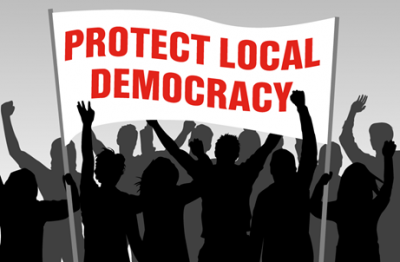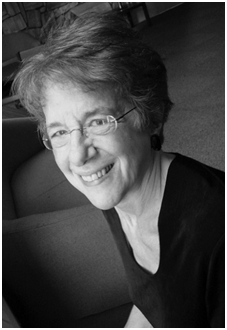
 Contributed by Dr. Mimi Abramovitz, Professor Emerita, Silberman School of Social Work, Hunter College, City University of New York
Contributed by Dr. Mimi Abramovitz, Professor Emerita, Silberman School of Social Work, Hunter College, City University of New York
If presidential elections are the front line in the battle for democracy, local governments call to mind the other front line. Closer to where we live and widely viewed as the foundation of American democracy, the other front line is also under siege.
The opponents of US democracy have long tried to prevent free and fair elections. It took from 1848 to 1920 for women to win the vote. It took from the end of the Civil War (1865) to the Voting Rights Act (1968) for Blacks and other persons of color to gain access to the ballot. It was not easy to get there. The labor, civil rights, and women’s liberation movements fought long and hard for the franchise. Sadly, each uphill victory provoked a massive backlash designed to restore male and/or white supremacy. The most recent backlash followed the election of the nation’s first Black president. Played out on the national front line, the backlash also gained traction on the local front line.
In the highly decentralized system of US governance, local authorities run local elections. Sadly, in 36 states these anti-democratic factions have increasingly entrenched themselves in the already vulnerable election machinery.[i] Once embedded they work hard to lower voter turnout. They gerrymander legislative districts, suppress the vote, organize misinformation campaigns, intimidate voters, enjoy access to unchecked dark money, and otherwise do their best to manipulate election outcomes and undermine democratic processes allowing them to achieve their own ends[ii]
It’s not just election interference. In town after town community institutions tasked with ensuring an informed electorate--another linchpin of democracy–face still other troublesome tactics designed to prevent a fair vote. Hoping that an uninformed public will be less able to resist their efforts, the opponents of democracy disrupt town meetings, ban books at local schools and libraries, censor local college curricula, appoint officials who carry their water, and fire those who do not. Often successful, these alarming efforts to restrict civic education and distort history, hinder people’s ability to translate their preferences into votes, increase the racial turnout gap,[iii] and promise to have long and chilling effects on the crucial dialogues, discussions, and debates that shore up democracy. [iv][v]
If voting did not matter so much, why do democracy’s opponents work so hard to suppress the vote, subvert election outcomes, and manipulate our basic democratic institutions? Those who would undo democracy want people to think their vote does not matter. They know that low voter turnout silences marginalized groups more than others and makes it possible for a small number of people with an outsized voice to support their anti-democratic, [vi] if not authoritarian, agenda. They know that many elected leaders win by small margins so that a few suppressed votes can make a big difference in ballot outcomes and future policy agendas.[vii]
In contrast, social workers know that communities that exercise their collective power and produce a high voter turnout–receive more attention, quicker responses, and greater resources from legislators/[viii] [ix]We know that voting determines whose voice gets heard and whose voice does not; who makes decisions and who does not; whose needs are met and whose are ignored. We know that voting builds power!
We also know that local voting promotes trust in government and support for our democratic institutions. Recent polls indicate that 60% of Americans are dissatisfied with US democracy,[x] double since 1995.[xi] The good news is that as of September 2023, 67% of Americans reported a “great deal” or “fair amount” of trust in local government; compared to 54% for their state government. and just 32% for the federal government.[xii].[xiii][xiv]
Perhaps most importantly social workers know that in a democratic society every vote does and must count in ALL elections. With your ideas and your help, VISW draws on this optimism to mobilize the local and the national vote [xv] Social workers ignore the other front line at our own risk.
[ii] https://www.cnet.com/news/politics/state-and-local-activism-needs-you-heres-what-to-know/
[iii] https://www.brennancenter.org/our-work/research-reports/impact-voter-suppression-communities-color
[iv] https://harvardpolitics.com/the-importance-of-local-elections/
[v] https://www.sciencedirect.com/science/article/abs/pii/S0261379413001522
[vi] https://secondratedemocracy.com/low-voter-turnout/
[vii] https://80000hours.org/articles/is-voting-important/?utm_source=google&utm_medium=cpc&utm_campaign=80KMAR-GrantsDSAs&utm_content=61209776527&utm_term=&gclid=EAIaIQobChMIlPnqoJzJgAMVyviUCR2xdQdfEAAYASAAEgJBIPD_BwE
[viii] https://hbr.org/2020/03/the-business-case-for-saving-democracy
[ix] https://secondratedemocracy.com/low-voter-turnout/
[x] https://www.pewresearch.org/short-reads/2022/06/30/how-americans-see-their-country-and-their-democracy/
[xi] https://www.voterstudygroup.org/publication/democracy-maybe
[xii] https://www.pewresearch.org/politics/2022/06/06/levels-of-government-federal-state-local/
[xiii] https://www.newsnationnow.com/politics/americans-local-government-congress-gallup/#:~:text=More%20than%20two%2Dthirds%20of,temporarily%20averted%20a%20government%20shutdown
[xiv] https://news.gallup.com/poll/512651/americans-trust-local-government-congress-least.aspx
[xv] https://www.vanityfair.com/news/2023/05/david-pepper-saving-democracy-interview